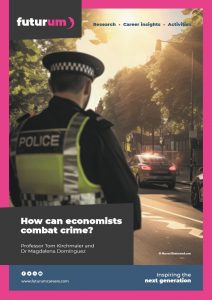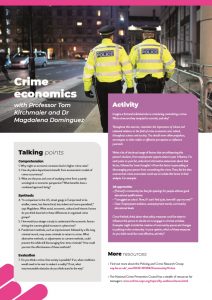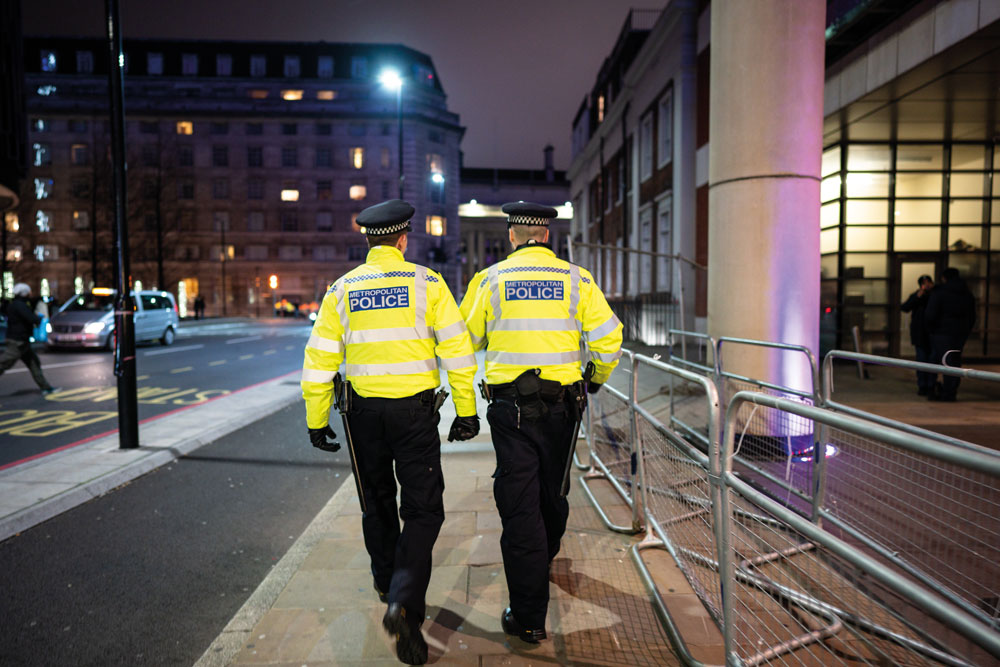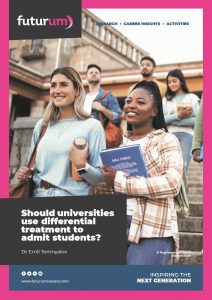How can economists combat crime?
How can economists help police forces to better assign their police officers onto the streets, thereby providing a better service to the public? In the Policing and Crime Research Group at the London School of Economics and Political Science, UK, Professor Tom Kirchmaier and Dr Magdalena Domínguez are using approaches from the field of economics to investigate crime and improve the efficiency of police departments.
Talk like a crime economist
Criminology — the study of crime and criminal behaviour
Cyber crime — criminal activities carried out on computers or online
Demographic — a characteristic of a group or individual, such as age, gender, etc.
Econometrics — using statistical models to understand data patterns and quantify different phenomena
Economics — the study of how people use and consume resources and respond to incentives
Incentive — something that encourages someone to do something
Money laundering — putting money made from illegal activities into legal sources of income
Recession — a period of economic decline, often accompanied by high unemployment rates
Sociology — the study of the social lives and interactions of humans
Why do some people turn to crime? How does crime impact society? And what improvements could police departments make to reduce crime? In the Policing and Crime Research Group at the London School of Economics and Political Science, Professor Tom Kirchmaier and Dr Magdalena Domínguez are hoping to answer these questions by investigating crime from an economic perspective.
“In the Policing and Crime Research Group, we study the full spectrum of questions around the causes and consequences of crime and the impacts of policing,” says Tom, who leads the group. “Our research covers areas as wide-ranging as how to prevent domestic abuse, the role of gangs in violent crime and money laundering, and how best to prioritise police resources.”
Can econometrics predict policing needs?
Knowing when and where to deploy police officers is key to addressing and deterring criminal activity. Tom has built an econometric model to help predict policing needs. “Econometrics uses statistical methods to forecast future trends from historical data,” he explains. “In this case, it involves gathering data on past crimes to anticipate how much police work will be needed in the future.”
Tom collected data from the entirety of England and Wales, including crime statistics (such as when and where previous crimes occurred), demographic information (such as population density and age profiles), economic factors (such as unemployment rates and the area’s economic services), seasonal variations (such as hours of daylight) and the influence of specific events on previous crime (such as concerts or sports matches).
By comparing how different factors correlated with the occurrence of crimes in the past, Tom built an econometric model to predict how these factors might influence crimes in the future. “In other words, given any specific situation, what do we expect to happen in terms of crime?” he explains. “Once we have these predictions, they can be used to assign police resources more effectively.” For example, if a football match will be held on a dark winter evening in a part of town with high unemployment rates, what level of police presence will be required? How would this compare with during the middle of a working day in a sparsely populated area of town that has a large elderly population? “This model helps police departments to enhance their efficiency by better allocating existing resources and addressing potential crime occurrences more effectively,” says Tom.
Reference
https://doi.org/10.33424/FUTURUM460
As crime economists, Tom and Magdalena use economic theories and methods to improve the efficiency of police departments by investigating crime from an economic perspective.
Can data analysis combat organised crime?
“Organised crime groups are structured criminal organisations that engage in illegal activities for financial gain,” explains Magdalena. This typically makes them more dangerous and harder to tackle than individual criminals working alone. “Organised crime groups have extensive networks and may often be involved in serious crimes, such as drug dealing, money laundering and cyber crime.”
Magdalena uses economic methods to understand how organised crime groups operate and how police can prevent them. “I use quantitative methods, such as econometric models and network analyses, to analyse numerical data in a structured and statistical manner,” she explains. “For example, I quantified the effects of mass arrests of gang members in Barcelona, Spain, on future criminal activity.” Magdalena found that, following these mass arrests, not only were the arrested criminals less likely to commit further crimes, but that crime rates also fell among their peers who were not arrested. “It seems that mass gang arrests have spillover effects that indirectly contribute to a further reduction in crime,” she says. “However, I also found that some key gang members were not arrested, indicating that the policy could have been designed better to achieve an even larger crime reduction.”
Getting the full picture
The study of crime has traditionally taken place through a sociology lens to understand the social, societal and human factors that make crime more or less likely. While crucially important for understanding crime, sociological approaches sometimes miss an important element – quantifying incentives. The economic situation of an individual or community can make a big difference to the likelihood of crimes being committed. For instance, a recession may lead to a lack of job opportunities, which in turn may cause some people to feel that crime is their best option for securing an income. If caught, having a criminal record can then make it even harder for that person to get a job, causing them to return to crime. Understanding how much these factors matter is crucial for policy design.
However, economic factors do not exist in isolation. Many social factors, such as peer influence, education level and mental health support, can also contribute to an individual’s decision to commit crimes. This highlights the importance of combining the quantitative approaches of economics with the typically more qualitative approaches of sociology and criminology. “By combining economics, criminology and sociology, we can better understand why crimes happen and find smarter ways to prevent them,” explains Tom. “This mix of ideas helps us see how society works, why people do what they do, and how different social and economic factors contribute to crime.”
The work of crime economists, such as Tom and Magdalena, is crucial for reducing crime, improving policing, and building a safer society for everyone.
 Professor Tom Kirchmaier
Professor Tom Kirchmaier
Dr Magdalena Domínguez
Policing and Crime Research Group, Centre for Economic Performance, London School of Economics and Political Science, UK
Field of research: Crime economics
Research project: Using economic methods to combat crime and improve policing
Funder: UK Economic and Social Research Council (ESRC)
About crime economics
Economics involves the study of decision making, including how people use resources and respond to incentives. Crime economics applies these concepts in the context of illegal activity. Crime economists study everything from the economic value of illegal trading to the financial consequences of crime to the economic impact for individuals caught up in the criminal justice system. For instance, if a criminal record limits a person’s future economic prospects, how likely are they to return to crime?
“We use economic frameworks and quantitative methods to understand the incentives, behaviours and impacts associated with criminal activities,” explains Tom. “This helps with resource allocation for crime prevention, effective policymaking, and understanding the economic effects of criminal activities on individuals and society.”
Applying the well-trodden approaches from economics in the context of crime can lead to new discoveries about what leads people to pursue illegal activities. “We pay attention to the cost-benefit analyses that people make when deciding whether crime is ‘worth it’,” explains Magdalena. “We use numbers to measure how these decisions can be influenced to make crimes seem less worthwhile.” These cost-benefit analyses can also be applied to police resourcing, helping police departments understand where money and effort is best directed to prevent crime.
Pathway from school to crime economics
• “At school, studying maths, economics, psychology and sociology will help build a foundational understanding of crime economics,” advises Tom.
• “At university, a degree in economics, criminology, statistics or public policy will offer more in-depth knowledge,” recommends Magdalena. “In addition, take data science courses to learn about quantitative analysis and data management.”
• Tom and Magdalena emphasise the importance of complementing your academic studies with practical research experience through internships and networking with professionals.
Explore careers in crime economics
• The Royal Economic Society (www.res.org.uk) runs a campaign called Discover Economics (www.discovereconomics.co.uk), which aims to change perceptions around economics and attract more students from under-represented groups. Efforts include free school workshops and the Young Economist of the Year competition.
• Tom and Magdalena suggest seeking internships with organisations involved in crime research or policymaking. This could include the National Crime Agency (www.nationalcrimeagency.gov.uk), local police departments, think tanks and research centres.
Meet Magdalena
Maths was always my favourite subject at school. I also enjoyed reading and spending time with friends, but I didn’t like studying natural science subjects, and I was never much of a sports person.
My career in crime economics came about by chance. I studied economics at university in Uruguay, but there were no courses on the economics of crime. However, while I was working as a research assistant, I got involved with a project studying the societal costs of crime. I realised this was a dynamic field where my research could have real-world impact.
I am very proud to have obtained my PhD, for which I investigated crime networks. A PhD requires a great deal of effort and determination. This can go unnoticed in academic circles, but I believe we should celebrate all achievements more.
Studying crime economics is interesting because there is still so much to learn. There are lots of research questions to answer, massive room for collaboration with public agencies and policymakers, and the potential to drive evidence-based change in society.
Magdalena’s top tips
Work hard and consistently, don’t be shy to reach out to people, and trust in yourself. You’re probably doing much better than you think!
Meet Tom
At school, I enjoyed studying physics and economics. I have also always loved being in the mountains at any time of the year.
Conducting crime economics research gives me purpose in life. The police show enormous interest in our work which highlights the need for this research to help society. Collaborating with police departments is very rewarding because, by using the data they share, we can tackle questions that would otherwise go unanswered.
Crime economics is fascinating in so many ways. It is also very rewarding to be able to make a real difference in the world. Our work helps make the police service more effective, while also understanding and tackling the root causes of crime. This will make life better for everybody in the long run.
As the Director of the Policing and Crime Research Group, I am very proud to have helped build an effective and impactful research team. Our work has a host of academic achievements and is improving the practices of police services around the world.
Tom’s top tip
Don’t just work hard – work smart too!
Write it in the comments box below and Tom or Magdalena will get back to you. (Remember, researchers are very busy people, so you may have to wait a few days.)
Economics is a very broad field and economic methods can be applied to a wide range of topics. Learn how economic theories can improve equality in education:
www.futurumcareers.com/should-universities-use-differential-treatment-to-admit-students







0 Comments